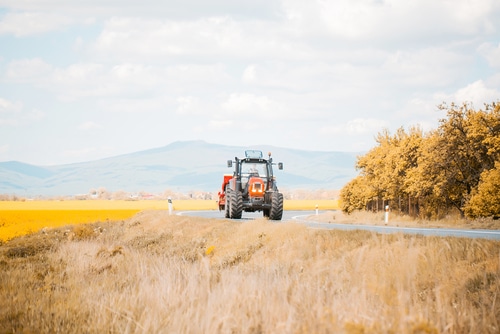
Avoid These Common Farm Equipment vs. Motor Vehicle Collisions
Apples. Corn. Cows. Soybeans. Pork. Milk. The list goes on as Michigan farmers are producing a wide range of foods, plants, and livestock – to be specific they grow more than 300 different types of commodities requiring big farm vehicles and massive equipment to travel on highways and narrow county roads alongside other vehicles. All drivers need to be aware and patient of these huge farm convoys since there can be more than enough room for everybody to share the road safely by following a few simple rules.
With the help of Michigan State University we took a closer look at the two most common causes of traffic collisions involving farm equipment.
- Farm Equipment is Big and Slow, Triggering Rear-End Collisions
If you approach slow-moving farm equipment, you will likely see flashing lights ahead or a slow-moving vehicle (SMV) sign on the back, the first step should be to slow down safely and stay alert. Since most farm equipment usually travels around 15-25 miles per hour, it only takes less than seven seconds for a car traveling at 55 mph to crash into the back of a tractor 300-400 feet away. Don’t be distracted. You could end up in a rear-end collision with these giant pieces of steel and the outcome is often fatal for drivers. So, slow down, stay aware and be patient to wait for an opportunity to safely pass. The farm tractor or equipment operator will probably already see you coming and will try to help you pass.
- Staying Alert and Watching For Swing Turns
Farm trucks and other heavy equipment is more than often larger than the width of one lane. They require the driver to swing heavy left or the right to make a turn. Watch for blinkers on the tractor, hand-signals from the driver or the presence of a field entrance or farm driveway, and then wait to see if the farmer is turning before you make any decisions to pass. Drivers should not assume that the equipment is moving over to allow them to pass but rather stay aware and well behind the farm equipment. This will only take a few seconds and require your patience. Once the turn is complete, the road will be clear and safe for you to continue your travel.
Farmers Should Also Travel Safely
Farmers and farm equipment operators are also responsible for roadway safety and should take steps to enhance farm machinery visibility for other drivers and their passengers. Before traveling on public roads, farmers need to:
- Lock brake pedals and double check, adjust and fix mirrors to ensure good lines of sight.
- Make sure that all warning flashers, lights, and slow-moving vehicle signs are working and easily visible.
- Tires should be inflated to the maximum recommended pressure for long-distance travel.
- Just like operating any big machinery or driving equipment, don’t be distracted.
Help Motor Vehicle Accident Victims, Farmers and Their Families
If you have been injured, or a loved one killed, in a collision between a motor vehicle and farm equipment, we can help. Please call Lee Free and speak to our farm truck and car accident attorneys at 1-800-LEE-FREE (1-800-533-3733) or fill out the Free Case Evaluation Form. And remember, you pay nothing until we settle your accident case.

